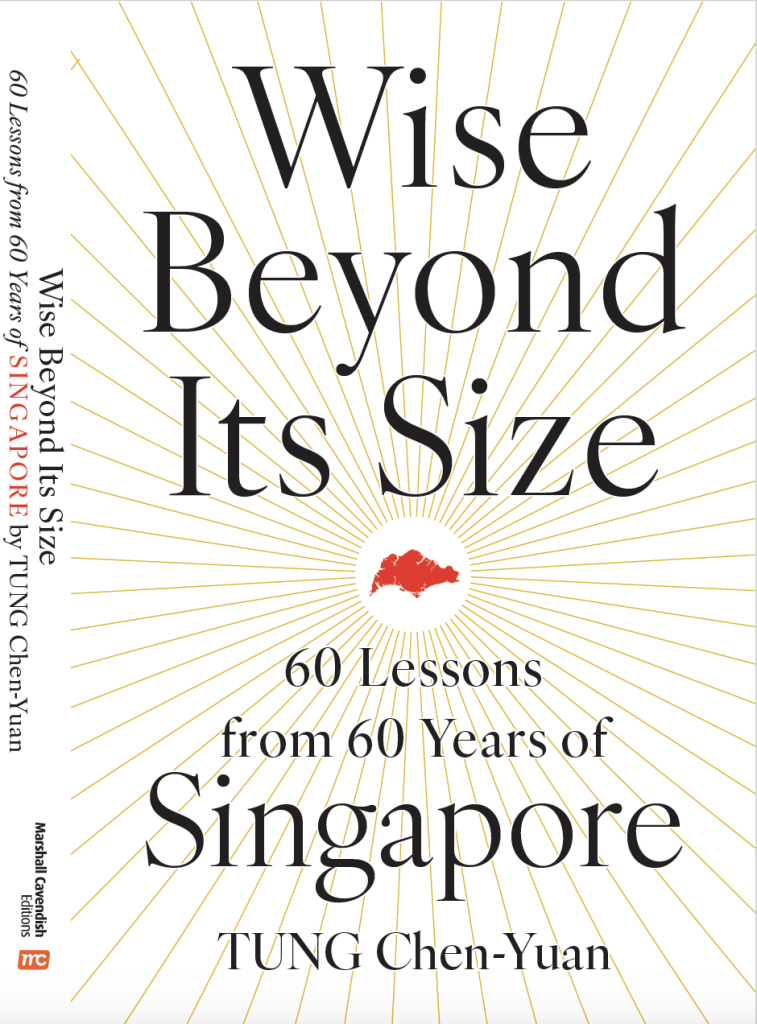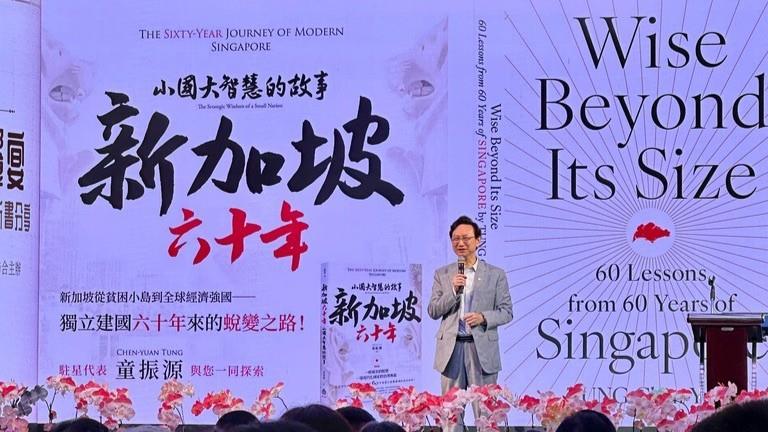Online book review commentary compiled, edited, and translated by Kaohsiung Times Staff (Image via Dr. Tung Chen-yuan Facebook page)
Singapore marked its 60th year of independence on August 9th, 2025, naturally leading many across Asia and the globe to reflect on its transformation from a vulnerable trading port into a global benchmark for governance, stability, and innovation. Among the most discussed commentaries was the new book Wise Beyond Its Size: 60 Lessons from 60 Years of Singapore (小國大智慧的故事:新加坡六十年) by Taiwanese scholar Dr. Tung Chen-yuan (童振源), currently Taiwan’s representative in Singapore.
The work — recently highlighted in multiple Singaporean media outlets, including Lianhe Zaobao (聯合早報) and Shin Min Daily News (新民日報) — examines the Singapore model from a distinctly Taiwanese perspective.
In total, five major reviews on Wise Beyond Its Size (English book link) have appeared between May and October 2025, reflecting growing regional interest in how outsiders interpret Singapore’s experience.

Taiwan’s View of Singapore’s “Miracle”
In Lianhe Zaobao, cultural commentator Ji Yun (紀贇) and senior journalist Chen Ying-chu (陳迎竹) both praised the book for avoiding Western theoretical filters. They noted that Tung’s analysis captures Singapore’s pragmatic governance — its focus on social cohesion, multiracial harmony, and merit-based institutions — while maintaining a deep respect for local context.
Tung writes that Singapore’s transformation cannot be explained by economic success alone. “Its true strength lies in societal stability, ethnic harmony, and national unity,” he argues.
This perspective struck a chord with Yan Meng-da (嚴孟達), a contributing columnist for Zaobao, who described the book as a reminder for Singaporeans to appreciate qualities so familiar they often go unnoticed — “the fragrance in a room of orchids that we no longer smell.”
Why Singapore Still Fascinates the World
As Yan observed, the smaller and more turbulent the world becomes, the more attention Singapore attracts – and recent figures underline why.
According to the International Monetary Fund’s World Economic Outlook (世界經濟展望), Singapore’s 2025 GDP is projected to reach US$561.7 billion, or 13% of Southeast Asia’s total output, despite accounting for less than 1% of the region’s population. In per capita terms, Singapore leads Southeast Asia with US$90,000, triple that of Brunei and far ahead of all other ASEAN nations.
Bloomberg’s latest Global Foreign Direct Investment Confidence Index ranked Singapore first in the Asia-Pacific region, with 62% of regional investors expressing net positive confidence — crediting political stability, sound governance, and business-friendly tax policies.
Yan writes that every crisis in Singapore’s history has somehow become a catalyst for renewal, from its early struggles for survival to its digital transformation today.
A Digital Ambition That Extends Beyond Borders
The book also highlights Singapore’s most recent national endeavor: the Singapore Digital Gateway (新加坡數碼門戶) — an ambitious platform launched to bridge both domestic and international digital divides.
Minister for Communications and Information Josephine Teo (楊莉明) said during a recent press briefing that the initiative aims to make Singapore’s digital governance models, AI frameworks, and open-source tools accessible to other countries seeking inclusive transformation.
In Tung’s analysis, this outward-looking “digital diplomacy” shows that Singapore’s success is not about isolation or self-congratulation, but about sharing lessons with the world.
An Enduring Example — and a New Challenge
Even as Singapore celebrates six decades of extraordinary progress, both Tung and local commentators caution that prosperity brings new social challenges — particularly falling birth rates and an aging population. “If Singapore can reverse its declining fertility trend,” Yan writes, “that would be the next true miracle.”
For now, Singapore remains what it has always been: a small nation with big lessons — a living example of how discipline, foresight, and unity can turn vulnerability into vision.



